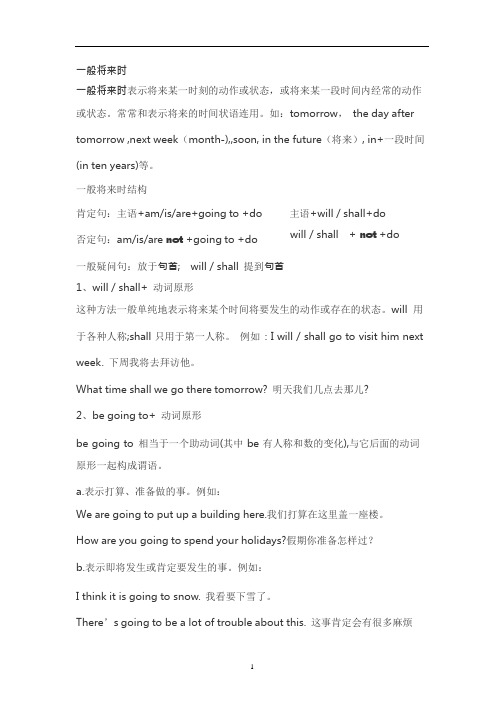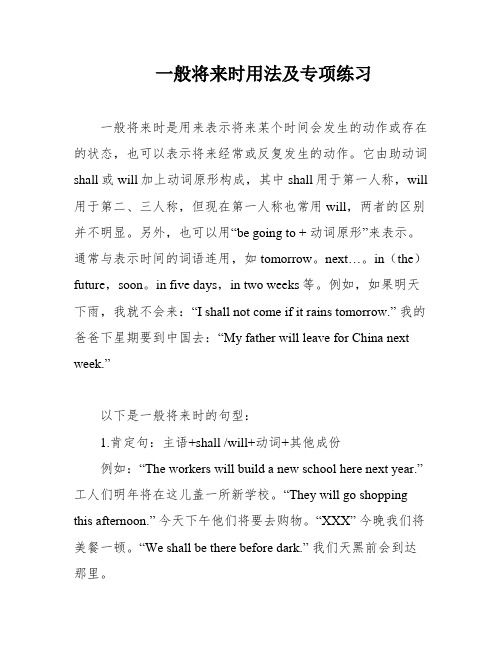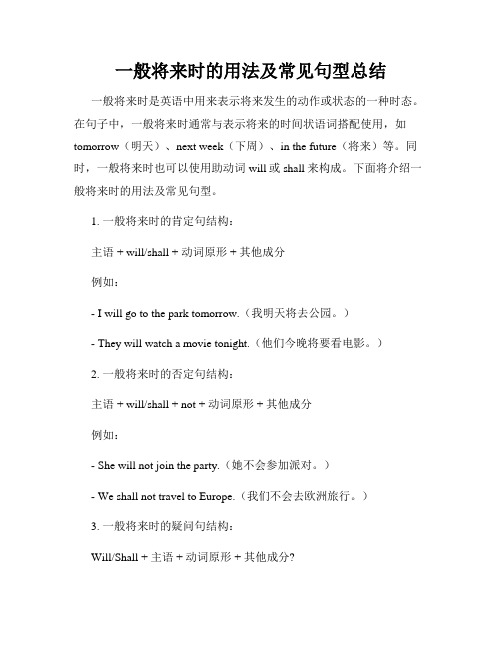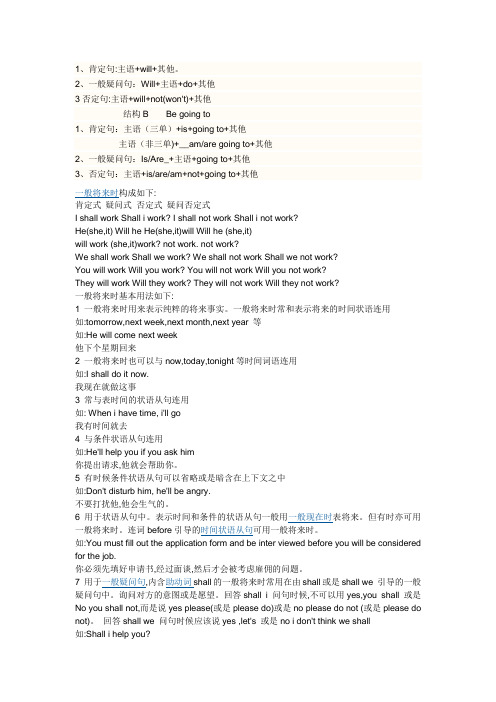一般将来时的用法与基本句型
- 格式:docx
- 大小:17.18 KB
- 文档页数:3

一般将来时1.一般将来时:表示将来要发生的动作或存在的状态。
2.一般将来时的助动词:will, shall(只用于主语是第一人称时), am going to, is going to, are going to3.一般将来时的谓语结构:will+V,shall+V,am going to+V,is going to+V,are going to+V (V表示动词原形)4.一般将来时的主语与谓语结构:肯定句一般疑问句否定句1) 主语+will+V Will+主语+V 主语+won’t+V (will not=won’t)2) I/We+shall+V Shall+I/We+V I/We+shan’t+V (shall not=shan’t)3) I+am going to+V Am+I+going to+V I+am not going to+V4) 主语(第三人称单数)+is going to+V Is+主语(第三人称单数)+going to+V 主语(第三人称单数)+isn’t going to +V5) 主语(复数人称)+are going to+V Are+主语(复数人称)+going to+V 主语(复数人称)+aren’t going to+V5.There be句型的一般将来时结构:肯定句一般疑问句否定句1) There will be…Will there be…There won’t be…2) There is going to be…Is there going to be…There isn’t going to be…3) There are going to be…Are there going to be…There aren’t going to be…6.句子中有下列结构时,句子用一般将来时:1) 句子中有tomorrow或tomorrow构成的时间短语:tomorrow, tomorrow morning, tomorrow afternoon, tomorrow evening, the day after tomorrow 例:They will have a party the day after tomorrow.=They are going to have a party the day after tomorrow.There is going to be a baseball match tomorrow afternoon.2) 句子中有“next+时间名称”的短语时:next week, next day, next year, next month, next spring, next term, next weekend,next morning…….(注意:句子中如果有“the next+时间名称”的短语,句子通常用一般过去时。

一般将来时知识经纬1.了解一般将来时的概念2.掌握一般将来时的用法、句型转换3.灵活运用一般将来时知识要点一、一般将来时的概念一般将来时表示将来某个时间要发生的动作或存在的状态。
如:I am going to play football tomorrow.我明天打算去踢足球。
He is going to have a picnic next week. 他下星期去吃野餐。
I will go to the park this weekend. 这个周末我要去公园。
二、一般将来时的结构句式结构:主语+ will/be going to + 动词原形+ 其他成分。
三、时间状语tomorrow, soon,the day after tomorrow, next week, in +一段时间等。
四、一般将来时的用法1. 含有be going to的句型(1) 肯定句:主+ be going to +动词原形+其他如:I'm going to have a picnic this afternoon.(2) 否定句:主+be+ not going to +动词原形+其他如:I'm not going to have a picnic this afternoon.(3) 一般疑问句:Be + 主+ going to +动词原形+其他?(be提到句首,some 改为any, and改为or,第一二人称互换。
)如:Are you going to have a picnic this afternoon?肯定回答:Yes, I am.否定回答:No, I’m not.2. 含有will的句型(will可用于所有人称,shall只用于第一人称I和we)( 1 ) 肯定句:主+ will +动词原形+其他如:I will play football tomorrow.(2) 否定句:主+ won’t +动词原形+其他(will后加not成won't)如:I won’t play football tomorrow.(3) 一般疑问句:Will + 主+ +动词原形+其他?(will提到句首,some改为any, and改为or,第一二人称互换) 如:Will you play football tomorrow?肯定回答:Yes, I will.否定回答:No, I won’t.五、一般将来时的特殊疑问句一般情况下,一般将来时的对划线部分有三种情况。

⼀般将来时时态⽤法讲解⼀般将来时时态1. ⼀般将来时的定义⼀般将来时表⽰在现在看来即将要发⽣的动作或存在的状态。
常⽤时间副词tomorrow, soon或短语next year / week / month, in a few days, in the future, sometime 做状语。
如:What will you do this afternoon?你今天下午⼲什么?We will have a meeting tomorrow. 我们明天要开会。
He is going to study abroad(到国外) next year. 明年他要出国学习。
2. ⼀般将来时的结构及应⽤(1) shall / will + 动词原形。
表⽰即将发⽣的动作或存在的状态。
特别是表⽰客观性的事情或在某条件下要发⽣的事情,只能⽤此结构。
如:What shall we do if he doesn’t come 如果他不来,我们该怎么办?Will you be free this evening 今天晚上有空吗?I think he will tell us the truth(真相)。
我想他会告诉我们真实情况的。
(2) be going to + 动词原形。
表⽰已经计划或安排好了的事情,也可表⽰有迹象表明肯定要发⽣的事情。
如:We are going to have a meeting to discuss (讨论)the matter this evening. 今天晚上开会讨论这件事情。
Look at the black clouds over there. I think it is going to rain soon. 看⼀看那边的乌云,我想天要下⾬了。
There is going to be an English evening this week. 本周要举⾏⼀个英语晚会。
(3) be +现在分词。

小学五年级重点知识归纳一般将来时的用法与句型构造【小学五年级重点知识归纳:一般将来时的用法与句型构造】一、一般将来时的用法一般将来时表示将来某个时间会发生的事情或者存在的状态。
它通常用来表达计划、打算、预测、意愿等。
二、一般将来时的句型构造1. 肯定句结构:主语 + will + 动词原形 + 其他成分例句:I will go to the park tomorrow.2. 否定句结构:主语 + will not / won't + 动词原形 + 其他成分例句:She won't eat dinner with us tonight.3. 疑问句结构:Will + 主语 + 动词原形 + 其他成分?例句:Will they visit their grandparents this weekend?4. 特殊疑问句结构:特殊疑问词 + will + 主语 + 动词原形 + 其他成分?例句:Where will you go on your vacation?三、一般将来时的常见时间状语1. tomorrow(明天)2. next week(下周)3. in the future(将来)4. soon(很快)5. in a year(一年后)等等四、一般将来时的其他用法1. 表示预测或推测的句子,常使用的词汇有:think,believe,hope,expect等。
例句:I think it will rain later.我认为一会儿会下雨。
2. 表示意愿、请求、建议等情态动词的用法。
例句:I will help you with your homework.我会帮你写作业。
五、一般将来时使用注意事项1. 在一般将来时中,主语为第三人称单数时,动词要加上“s”或者“es”。
例句:He will playsoccer with his friends tomorrow.2. 一些动词在一般将来时的变化形式是不规则的,需要特别注意。





一般将来时一、知识梳理(一)基本用法1.概念一般将来时表示将来某一时刻的动作或状态,或将来某一段时间内经常的动作或状态。
2.构成基本构成句型例句am/is/are going todo肯定句I am going to go fishing next weekend.否定句I am not going to go fishing next weekend.一般疑问句Are you going to go fishing next weekend?特殊疑问句What are you going to do next weekend?will/shall do肯定句I shall/will visit my grandmother on Sunday.否定句I shall/will not(won’t)visit my grandmotheron Sunday.一般疑问句---Will you visit my grandmother on Sunday?---Yes,I will./No,I won’t.特殊疑问句What will you do on Sunday?3.常用时间状语明天下个XX后明天:tomorrow,后面可以加morning,afternoon,evening下个:next,后面可以加week,month,year等XX后:after和in,后面可以加three weeks/months/years这里要注意一下,after后加时间点才表示将来,如after3o’clock。
加时间段表示过去,如after2hours表示过去。
in后加时间段表将来,如in two years。
(二)考点1.will和shall的区别will可用于所有人称,但shall仅表示单纯将来时,用于第一人称I和we,作为will的一种替代形式。
以You and I为主语时通常避免用shall。
如:He will be back soon.他很快就会回来。

一般将来时的知识点1.构成一般将来时的基本句型:a. 使用“will”加上动词原形:主语 + will + 动词原形 + 其他补充信息。
例如:I will go to the movies tonight.(今晚我要去看电影。
)b. 使用“be going to”加上动词原形:主语 + be going to + 动词原形 + 其他补充信息。
例如:She is going to visit her grandparents next week.(下周她要去看望她的祖父母。
)2.表达将来计划或意图:例如:I am going to study abroad next year.(明年我打算出国学习。
)3.表达预测、预言或推测:例如:It will rain tomorrow.(明天会下雨。
)4.时间状语与一般将来时:在一般将来时中,我们常常会使用一些时间状语来表示将来时间。
例如:tomorrow(明天)、next week(下周)、in the future(将来)等。
5.否定句和疑问句的构成:a. 否定句:在“will”或“be going to”之后加上“not”来构成否定句。
b. 疑问句:将“will”或“be going to”放在句首来构成疑问句。
例如:Will you go shopping with me?(你愿意和我一起去购物吗?)6.一般将来时的注意事项:a.一般将来时通常用于预测、计划或意图,并且与将来相关的特定时间。
例如:I will see you at 8 o'clock tomorrow morning.(明早8点我会见你。
)b. 当我们根据目前情况做出决定或预测未来时,我们常常使用“be going to”来表示。
例如:Look at those dark clouds. It is going to rain.(看那些乌云,天要下雨了。
)c.当我们做将来的决定或预测时,我们可以根据目前已经发生的事实和证据进行推测。

一般将来时讲解(附习题+答案)一、一般将来时的含义:表示动作发生在将来二、一般将来时的句型:(1) will/shall+动词原形(2) be going to+动词原形三、一般将来时的时间状语:tomorrow(明天)、the day after tomorrow(后天)、next...(下一...): next week(下一周)、next year(明年)、next month(下个月)in+一段时间(...之后): in three days(三天之后)、in the future在未来this evening(今天晚上)四、一般将来时的句型结构:(1) will/shall+动词原形(will not =won’t)(will 各种人称均可用,shall 只能用于第一人称)1)肯定句:主语+will/shall+动词原型...如:I will go to school tomorrow.我明天将会去学校He will go to school tomorrow.他明天将会去学校。
2)否定句:主语+will/shall+not+动词原型...如:I won’t go to school tomorrow.我明天将不会去学校。
He won’t go to school tomorrow.他明天将不会去学校。
3)一般疑问句:Will/Shall +主语+动词原型...如:Will you go to school tomorrow?你明天要去学校吗?Will he go to school tomorrow?他明天要去学校吗?肯定回答:Yes, 主语+will.如:Yes, I will.Yes, he will.否定回答:No,主语+will+not.如:No, I won’t.No, he won’t.4) 特殊疑问句:特殊疑问词+will/shall+主语+动词原型...如:What will you do tomorrow?你明天将会做什么?What will he do tomorrow?他明天将会做什么?(2) be going to+动词原形1)肯定句:主语+be going to +动词原型...如:I am going to buy some books tomorrow.我明天打算去买一些书。

一般将来时用法及专项练习一般将来时是用来表示将来某个时间会发生的动作或存在的状态,也可以表示将来经常或反复发生的动作。
它由助动词shall或will加上动词原形构成,其中shall用于第一人称,will 用于第二、三人称,但现在第一人称也常用will,两者的区别并不明显。
另外,也可以用“be going to + 动词原形”来表示。
通常与表示时间的词语连用,如tomorrow。
next…。
in(the)future,soon。
in five days,in two weeks等。
例如,如果明天下雨,我就不会来:“I shall not come if it rains tomorrow.” 我的爸爸下星期要到中国去:“My father will leave for China next week.”以下是一般将来时的句型:1.肯定句:主语+shall /will+动词+其他成份例如:“The workers will build a new school here next year.” 工人们明年将在这儿盖一所新学校。
“They will go shopp ing this afternoon.” 今天下午他们将要去购物。
“XXX” 今晚我们将美餐一顿。
“We shall be there before dark.” 我们天黑前会到达那里。
2.否定句:主语+shall /will+not+动词+其他成份例如:“XXX’t come back this week.” 这一周她不回来了。
“I will not go shopping one hour later.” 一小时之后我不会去购物。
“He won’t play football with you before he finishes his work.” 他干完活后才能跟你踢足球。
3.疑问句:shall /will+主语+动词+其他成份。

一般将来时的用法及常见句型总结一般将来时是英语中用来表示将来发生的动作或状态的一种时态。
在句子中,一般将来时通常与表示将来的时间状语词搭配使用,如tomorrow(明天)、next week(下周)、in the future(将来)等。
同时,一般将来时也可以使用助动词will或shall来构成。
下面将介绍一般将来时的用法及常见句型。
1. 一般将来时的肯定句结构:主语 + will/shall + 动词原形 + 其他成分例如:- I will go to the park tomorrow.(我明天将去公园。
)- They will watch a movie tonight.(他们今晚将要看电影。
)2. 一般将来时的否定句结构:主语 + will/shall + not + 动词原形 + 其他成分例如:- She will not join the party.(她不会参加派对。
)- We shall not travel to Europe.(我们不会去欧洲旅行。
)3. 一般将来时的疑问句结构:Will/Shall + 主语 + 动词原形 + 其他成分?- Will you come to the concert?(你会来听音乐会吗?)- Shall we visit the museum tomorrow?(我们明天要参观博物馆吗?)4. 一般将来时的特殊用法:a. 表示计划或安排例如:- We will have a meeting next Monday.(我们下周一要开会。
)- They will go on a vacation in August.(他们八月份将去度假。
)b. 表示意愿或意图例如:- He will help you with your homework.(他愿意帮你做作业。
)- She shall buy a new car soon.(她打算很快买辆新车。
)c. 表示预测或推断例如:- It will rain tomorrow.(明天会下雨。

一般将来时的句型结构和例句1. 一般将来时的概念嘿,大家好!今天我们来聊聊一般将来时。
说到将来时,想必大家都有过这样的体验:想给朋友约个时间,或者规划个旅行,但又不知道该怎么表达对未来的期望和计划。
其实,一般将来时就像那颗星星,指引着我们走向未知的未来。
简单来说,它主要用来表示将来发生的事情。
这种时态很容易搞定,通常使用“will”或者“be going to”来构成,简单明了,不费吹灰之力。
2. 一般将来时的基本结构2.1 “will”结构首先,我们来看看用“will”构成的一般将来时。
它的句型结构就是:主语 + will + 动词原形。
比如,如果你想告诉朋友“我明天会去图书馆”,你可以说“I will go to thelibrary tomorrow。
”听起来是不是很顺畅呢?再比如,“她会参加派对”就可以说成“She will attend the party.”是不是感觉自己就像个未来学家?2.2 “be going to”结构接下来,我们聊聊“be going to”结构。
这个结构的形式是:主语 + be (am/is/are) + going to + 动词原形。
比如,“我打算去旅行”可以说“I am going to travel.” 这里的“going to”就像个小火箭,把我们的计划送向未来。
再来个例子:“他们准备去看电影”就可以说“They are going to watch a movie.” 听起来是不是很有干劲?3. 一般将来时的应用场景3.1 表达意图和计划那么,一般将来时到底在哪些场合能派上用场呢?哦,真是无处不在!比如,当你和朋友一起讨论周末的计划时,“我们将去海滩吗?”可以问“We will go to the beach, right?”或者,当你在职场上,需要告诉同事下周的会议时间时,“我们下周三会开会”可以说“We will have a meeting next Wednesday.” 这些都是日常生活中常见的场景,毫不费力地用上将来时,简直就是小菜一碟!3.2 预测未来此外,一般将来时也常用于预测未来。

一般将来时一、基本内容1.构成:“助动词will+ 动词原形”2。
含义及用法:一般将来时表示将来某个时间将要发生的动作或存在的状态,也表示将来经常或反复发生的动作。
3。
时间状语:一般将来时常与表示将来的时间状语连用,如:tomorrow, next week,next year, in the future等。
Eg: They will visit Shanghai next week。
People will have robots in their homes in the future.二、句型转化1、肯定句:“主语+will +动词原形+其他。
” Eg: They will have a test next week。
2、否定句:在will 后加 not ,即“主语+won't +动词原形+其他.”Eg: She will be an engineer.(改为否定句)She won’t be an engineer。
3、一般疑问句:将will提到主语前面,即“Will+ 主语+动词原形+其他?"回答时使用yes/no。
Eg: He will live in New York in 10 years. (改为一般疑问句并作肯定回答)Will he live in New York in 10 years? Yes, he will.三、注意事项1、Will 常表示客观的将来,也可表示“带意愿色彩的将来”,也可表示“委婉客气的邀请或命令”Eg: He will be 18 years olds next month.下个月他将满18岁。
I will tell you all about it. 我愿意把所有与此相关的事都告诉你。
Will you please close the door? 请你把门关上好吗?2、在疑问句中,主语为第一人称(I 和we)时,常用助动词shall。

1、肯定句:主语+will+其他。
2、一般疑问句:Will+主语+do+其他3否定句:主语+will+not(won't)+其他结构B Be going to1、肯定句:主语(三单)+is+going to+其他主语(非三单)+__am/are going to+其他2、一般疑问句:Is/Are_+主语+going to+其他3、否定句:主语+is/are/am+not+going to+其他一般将来时构成如下:肯定式疑问式否定式疑问否定式I shall work Shall i work? I shall not work Shall i not work?He(she,it) Will he He(she,it)will Will he (she,it)will work (she,it)work? not work. not work?We shall work Shall we work? We shall not work Shall we not work?You will work Will you work? You will not work Will you not work?They will work Will they work? They will not work Will they not work?一般将来时基本用法如下:1 一般将来时用来表示纯粹的将来事实。
一般将来时常和表示将来的时间状语连用如:tomorrow,next week,next month,next year 等如:He will come next week他下个星期回来2 一般将来时也可以与now,today,tonight等时间词语连用如:I shall do it now.我现在就做这事3 常与表时间的状语从句连用如: When i have time, i'll go我有时间就去4 与条件状语从句连用如:He'll help you if you ask him你提出请求,他就会帮助你。

一般将来时、be going to用法一、一般将来时的动词形式一般将来时表示将要发生的动作或存在的状态;或是打算计划以及决定要做某件事情等。
常与tomorrow, next… , in (the)future,soon, in five days,in two weeks等连用。
“I’ll, You’ll, He’ll , She’ll , It’ll, We’ll , They’ll …”是简缩形式。
其结构有如下几种:1.will + 动词原形(will可以用于任何人称)注意:当主语是第一人称时will可以换成shall,特别是在以I或we作主语的问句中,一般用shall.She will come back in three days.Shall we go to the zoo?I will be at home tomorrow.2.be going to +动词原形They are going to clean their classroom this afternoon.二.一般将来时的各种句型1.肯定句:主语+shall /will+动词+其他.They will go shopping this afternoon. (译出中文)We shall be there before dark. (译出中文)2.否定句:主语+shall /will+not+动词+其他.They will go shopping this afternoon. (译出中文)We shall not be there before dark. (译出中文)3.一般疑问句:shall /will+主语+动词+其他?Will they go shopping this afternoon? (译出中文)Shall we be there before dark? (译出中文)4.特殊疑问句:特殊疑问词+shall /will+主语+动词+其他?When will they go shopping? (译出中文)What sall I do? (译出中文)5.there be的将来时:there will beThere will be a show in the park tonight.(译出中文)一、选择1. _____you ____a doctor when you grow up? A Will; going to be B Are; going to be C Are; / D Will; be2. He will be back _____a few minutes. A with B for C on D in3. What time _____we meet at the gate tomorrow? A will B shall C do D are4. It ____my brother’s birthday tomorrow. She is going to have a party. A is going to be B will be C will is D will have5. Li Ming is 10 years old now, next year he _____11. A is B is going to be C will be D will to be二、用所给词适当形式填空1. -“I need some paper.”- “I ____(bring)some for you.”2.____ (be)you free tomorrow?3. They _________(not leave) until you come back.4. _____we_____(go) to the party together this afternoon?5. There (be) a sports meeting in our school tomorrow.6. I _____(go) with you if I have time.7.Hurry up! Or we ______(be) late. 8.What ____you _______(do) tomorrow afternoon?9. Jenny ____ _____ (do) an experiment the day after tomorrow.10. If she isn’t free tomorrow, she _______(not take) part in th e party.be going to用法be going to 是一种固定结构,其中"be"会根据主语的人称变化用"is, am ,are",它后面要接动词原形。

一般将来时一、定义一般将来时表示在现在看来即将要发生的动作或存在的状态。
常用时间副词tomorrow, soon或短语next year / week / month, in a few days, in the future, sometime 做状语。
二、一般将来时的基本结构1.shall/will + 动词原形shall 用于第一人称,will用于第二、三人称。
除英国外的说英语的国家,在陈述句中,即使在第一人称一般也用will,在英国也有这种趋势。
will的缩写形式为’ll, 如:I’ll, you’ll等; shall not的缩写式为:shan’t;will not 的缩写式为:won’t.(1) shall+动词原形肯定句:I/We shall go to the zoo.否定句:I/We shall not go to the zoo.(2)will +动词原形肯定句否定句一般疑问句特殊疑问句I/We will go to the zoo. I/We will not go tothe zoo.Will you go to thezoo?(回答:Yes, I/we will./No,I/we won’t.Where will yougo?You/He/She/The y will go to the zoo.You/He/She/Theywill not go to thezoo.Will he/she/they goto the zoo?(回答:Yes,he/she/they will. /No,he/she/they won’t.)Where willhe/she/they go?2. be going to +动词原形肯定句否定句一般疑问句特殊疑问句I am going to visit friends. I am not going tovisit friends.Are you going tovisit friends?(回答:Yes, Iam./No, I’m not.)What are you goingto do?He/She is going to visit friends. He/She is not goingto visit friends.Is he/she going tovisit friends?(回答:Yes, he/sheis./No,he/she isn’t.)What is he/shegoing to do?We/You/They are going to visit friends. We/You/They are notgoing to visit friends.Are you/they goingto visit friends?(回答:Yes, we/theyare./No,we/theydon’t.)What are you/theygoing to do?三、一般将来时的基本用法1.表示单纯的将来事实,由“will / shall + 动词原形”构成。
一般将来时的用法与基本句型
一般将来时表示将来某一时刻的动作或状态,或将来某一段时间内经常性的动作或状态,那么你知道如何去使用呢?以下是由店铺整理关于一般将来时的用法的内容,希望大家喜欢!
一般将来时的用法
一、一般将来时的定义
用于表示将来某一时刻的动作或状态,或将来某一段时间内经常的动作或状态。
常常和表示将来的时间状语连用,如:tomorrow, next week, in the future等。
(will常简略为'll,并与主语连写在一起,如:I'll, she'll, he'll, it'll, we'll, you'll, they'll)
二、一般将来时的构成
1. will/shall+动词原形”
Iwill/shall go to visit him next week.
下周我将去拜访他。
2. be going to+动词原形
Thereis going to be a football match this afternoon.
今天下午将有一场足球比赛。
Iam going to go to the park.
我将要去公园。
三、一般将来时的应用
1. 肯定句
主语+will+动词原形+其他,如:
Theywill have a test next time.
下次他们将有一次测试。
He will get married.
他就快结婚了。
主语+will not +动词原形+其他,如:
Shewill not be an engineer.
她不会成为一位工程师。
3. 一般疑问句
Will+主语+动词原形+其他+?,回答时使用yes/no. 如:
Willhe live in New York in 10 years?
他会在纽约住10年吗?
Yes,he will.是的,他会。
4. 特殊疑问句
特殊疑问词+will+主语+动词原形+其他+?.如:
Why will you be here on Sunday?
周日你为什么会在这儿?
I will have a meeting on Sunday.
我将要在周日举行一个聚会。
(对特殊疑问句要进行具体回答)
一般将来时的基本句型
be going to表示客观安排或受人指示而做某事。
后+动词原形。
be about to+动词原形,意为马上作某事,不能与tomorrow,next week等表示明确将来时的时间状语连用。
肯定句:I/We shall/will go. You/He/She/They will go.
否定句:I/We shall/will not go. You/He/She/They will not go.
疑问句:Shall/Will we go? Will you/he/she/they go?
简略回答:(肯)Yes,主语shall/will (否) No,主语 shall/will not
特殊疑问句:一般将来时的特殊疑问句是将疑问词放在句首,后接一般疑问句(就主语提问时,以疑问词who开头的疑问词除外) ----- Why will you be here on Sunday?(周日你为什么将要在这儿?)
-----I will have a meeting on Sunday(我将要在周日举行一个聚会)
(对特殊疑问句要进行具体回答)
一般疑问句:be或will提到句首,some改any,and改or,第一二人称互换
We are going to go on an outing this weekend.-------Are you
going to go on an outing this weekend?
被动句:will/shall+be+v.ed(及物动词过去分词)
The letter will be sent tomorrow.
这封信明天将寄出去
We shall be punished if we break the rule.
如果我们违反规定,我们将受到惩罚。
注意:will和shall在句子中所表达的“意志”是不同的,当句子主语是第一人称(I)的时候表示的是主语 I 的自主“意志”,很多人可能会问什么是自主意志。
那么下面就举个例子:
I will be clear tomorrow . 我会把这件事弄个水落石出(词句有多个意思,这里举此例)
分析:这个句子中用will时,主语 I(我) 就带有强烈的意志,意思是我想让事情水落石出,并且有我会为此付诸努力的意思。
当第一人称,用shall的时候就是一个普通的句子,就没有主语的意志。
I shall come back in ten minutes .这句话就是单纯的说我会在10分钟后回来没有别的意思
I will come back in ten minutes. 而这句话就有一种意境上的不同。
我会在10分钟后回来,其中的意思还有,就算我有事耽搁了我也会想办法在10分钟后回来的意思
shall在第二、三人称时也和will在第一人称一样。
也只有在二三人称才带有意志,只不过shall带有的是“说话者”的意志。
而不是主语的意志。
如:he shall be rewarded. 他会得到回报
分析这句话更深度的意思,我说过在shall用在第二三人称时有强烈的“说话者”的意志。
而这句话的“说话者”意志就是他会得到回报,就算他没有得到回报“说话者”也会想办法让“he”得到回报。